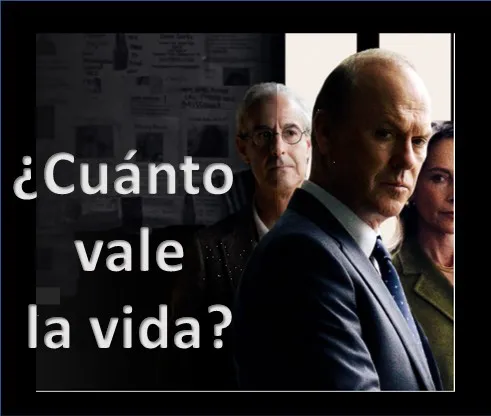
¿Cuánto vale la vida? es la película que nos presenta Neflix para conmemorar los veinte años transcurridos desde el atentado a las Torres Gemelas y el Pentágono en Estados Unido. Bordeando el drama del momento se enfoca en lo que vino después, en los familiares de las víctimas y el aspecto legal-económico del fondo de compensación que el Estado negociará con estas personas.
Basada en casos reales, toma como eje las acciones del abogado, Kenneth Feinberg, asignado para llevar el caso.
El guionista, Max Borenstein, que con este film rompe con lo que venía realizando, películas del género fantásticos y suspenso, basa el mismo en el libro de Kenneth Feinberg. Dirigida por Sara Colangelo y protagonizada por Michael Keaton como el abogado Kenneth Feinberg; Stanley Tucci como Charles Wolf, esposo de una de las víctimas; Amy Ryan (Camille Biros, socia) y Shunori Ramanthan (Priya Khundi) abogadas del bufete de Feinberg y Tate Donovan como Lee Quinn abogado que desea representar a las victimas para demandar a las líneas aéreas.
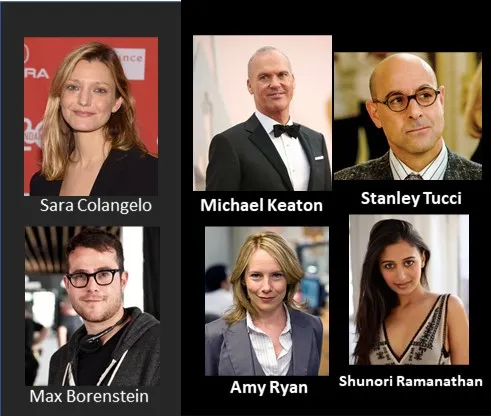
La trama
La primera escena nos ubica en un contexto universitario donde el abogado Kenneth Feinberg inicia una dinámica con sus alumnos a partir de una pregunta ¿Cuánto vale la vida? Para finalmente concluir que todo se reduce a determinar una cifra donde ambas partes estén de acuerdo.
En los siguientes minutos vemos junto a Kenneth, a través de la ventana del tren donde viaja, el humo negro saliendo de las torres. Ha ocurrido el atentado. Lo que siguen son tomas rápidas de las personas saliendo de entre los escombros y el polvo para introducirnos en el tema central del film.
Se encuentran reunidos un grupo de abogados con representantes del Estado en una discusión que trata de fijar cual será la mejor vía para que las personas afectadas por los hechos no demanden a las líneas aéreas ni al gobierno ya que esa posible acción crearía un gran desequilibrio económico a la nación, impactando de manera negativa toda la economía del país. La idea es crear un fondo compensatorio que le dé a las personas afectadas una indemnización.
Kenneth, que era participe de la reunión, en sus reflexiones posteriores decide que quiere tomar el caso. Se reune con el alto funcionario del gobierno que esta recogiendo la propuestas de los abogado y le expone su interés en asumir la responsabilidad de encontrar la mejor formula para determinar los montos compensatorios que recibirá cada familia afectada por la pérdida de su ser querido. Kenneth, deja claro que no cobrará honorarios por el trabajo realizado, siente que es su aporte y ayuda a la nación y a los deudos por toda la tragedia ocurrida.
El trabajo comienza, son aproximadamente 7.000 personas afectadas, Kenneth, con su equipo, (Camille Biros y Priya Khundi) trabajan en la formula que les permitirá calcular los montos que le corresponderán a cada uno de los afectados. Una formula, basada en lo que contempla la ley y con unos criterios preestablecidos, entre los cuales resaltan: el trabajo que realizaba la persona que murió y los bienes materiales que poseía.
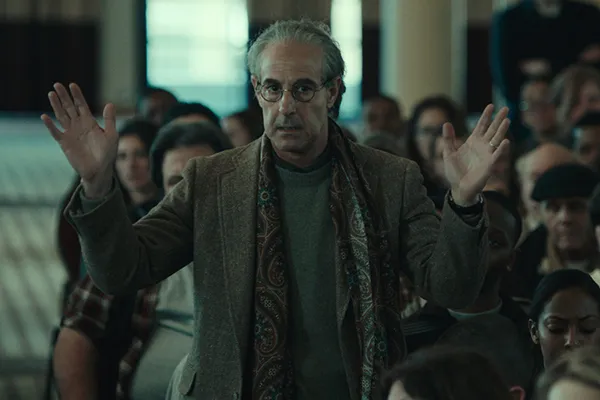
Aquí es donde aparece Charles Wolf (Stanley Tucci) con su excelente actuación. cuestiona la formula por considerarla injusta, poco equitativa y que no atiende a las necesidades particulares de los deudos, pronto se erige como líder del grupo marcando una tendencia hacia las demandas individuales. Lee Quinn (Tate Donovan), es el abogado que esta detrás de las demandas individuales, una propuesta que puede ser de mayor beneficios para los afectados, sin embargo, media un largo proceso de juicio, así como, la posibilidad real de no llegar a acuerdos.
El tiempo corre, los plazos para llegar a un acuerdo con un mínimo de 80% de aceptación no llega a 30% y pedir una prorroga implica entrar en otro proceso distinto al planteado. Finalmente, Kenneth Feinberg, va comprendiendo que el camino tomado no es el acertado, que las personas requieren ser escuchadas y que sean tomadas en cuenta en su particularidad, que una formula nunca dará la respuesta de justicia que todos queremos.
Comentario Intencionado
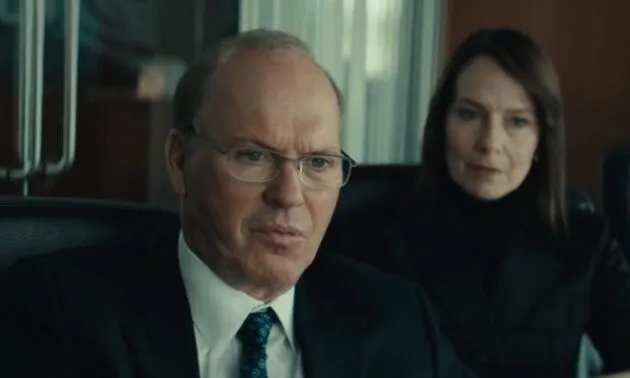
El drama social un género fílmico que nos muestra realidades sociales que abarcan lo político, económico, lo ético y moral que tiene un hecho. El terrorismo, el 11 de septiembre de 2001, rompió los límites nacionales y fronterizos, haciendo al mundo, partícipe de una ola de terror e incertidumbre. Para los que vivieron el hecho se les agrega el dolor.
¿Cuánto vale la vida? Nos da una mirada practica de como se resuelven los problemas sociales desde lo político, económico y legal, donde la vida es despojada de lo afectivo-relacional para convertirse en una cifra. Una cifra que nada tiene que ver con lo que realmente significa “la vida”.
Por otra parte, da giro a la moneda y nos presenta una visión más humanizada, aquella que es capaz de romper la rigidez del pensamiento y desde donde es posible pensar la justicia en términos de igualdad de condiciones. Una película que resalta el valor de la empatía como condición necesaria, no solo para comprender al otro sino también como motor que genera cambios en las dinámicas sociales y las bases que sustentan a estas.
Dicen que una sola persona no puede cambiar el mundo pero, a lo largo de la historia de la humanidad, sabemos de personas que con su accionar han iniciado transformaciones que van haciendo del mundo un lugar mejor al que encontraron.
Al final de la película se da un listado de las negociaciones y fondos de compensaciones en que Kenneth Feinberg y su socia han participado como mediadores y/o administradores, confirmando esa información, me asombra y llena de admiración esa voluntad y compromiso.

In English
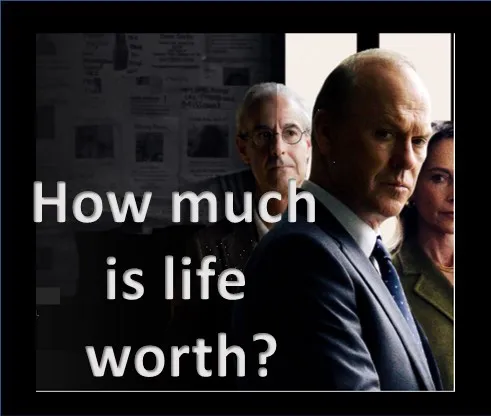
How much is life worth? is the film presented by Netflix to commemorate the twenty years since the attack on the Twin Towers and the Pentagon in the United States. Bordering on the drama of the moment it focuses on what came after, on the families of the victims and the legal-economic aspect of the compensation fund that the State will negotiate with these people.
Based on real cases, it takes as its axis the actions of the lawyer, Kenneth Feinberg, assigned to handle the case.
The screenwriter is Max Borenstein, who with this film breaks with what he had been doing, films of the fantastic and suspense genre. Directed by Sara Colangelo and starring Michael Keaton as the lawyer Kenneth Feinberg; Stanley Tucci as Charles Lobo, husband of one of the victims; Amy Ryan (Camille Biros, partner) and Shunori Ramanthan (Priya Khundi) lawyers of Feinberg's firm and Tate Donovan as Lee Quinn lawyer who wants to represent the victims to sue the airlines.

The Plot
The first scene places us in a university context where the lawyer Kenneth Feinberg initiates a dynamic with his students based on a question: How much is life worth? To finally conclude that it all comes down to determining a figure where both parties agree.
In the following minutes we see Kenneth, through the window of the train where he is traveling, the black smoke coming out of the towers. The attack has occurred. What follows are quick shots of people emerging from the rubble and dust to introduce us to the central theme of the film.
A group of lawyers and government representatives are meeting to discuss the best way for the people affected by the events not to sue the airlines or the government, since such an action would create a great economic imbalance for the nation, negatively impacting the country's economy as a whole. The idea is to create a compensatory fund that will give the affected people a compensation.
Kenneth, who was a participant in the meeting, in his later reflections decides that he wants to take the case. He meets with the senior government official who is collecting the lawyers' proposals and expresses his interest in taking on the responsibility of finding the best formula to determine the amount of compensation that each family affected by the loss of their loved one will receive. Kenneth makes it clear that he will not charge any fees for the work he feels it is his contribution and help to the nation and the bereaved for all the tragedy that has occurred.
The work begins, there are approximately 7000 people affected, Kenneth, with his team (Camille Biros and Priya Khundi) is working on the formula that will allow them to calculate the amounts that will correspond to each of those affected. A formula, based on what the law contemplates and with some pre-established criteria, among which stand out: the work performed by the person who died and the material goods he or she owned.

Here is where Charles Wolf (Stanley Tucci) appears with his excellent performance. He questions the formula for considering it unfair, inequitable and that it does not attend to the particular needs of the bereaved, and soon becomes the leader of the group, marking a tendency towards individual demands. Lee Quinn (Tate Donovan), is the lawyer behind the individual lawsuits, a proposal that may be of greater benefit to those affected, however, mediates a long trial process, as well as, the real possibility of not reaching agreements.
Time is running out, the deadlines to reach an agreement with a minimum of 80% acceptance do not reach 30% and requesting an extension implies entering into another process different from the one proposed. Finally, Kenneth Feinberg is realizing that the path taken is not the right one, that people need to be heard and to be taken into account in their particularity, that a formula will never give the answer of justice that we all want.
Intentional Commentary

Social drama is a film genre that shows us social realities that encompass the political, economic, ethical and moral aspects of an event. Terrorism, on September 11, 2001, broke national and border limits, making the world participate in a wave of terror and uncertainty. For those who lived through the event, the pain is added.
How much is life worth? It gives us a practical look at how social problems are solved from the political, economic and legal point of view, where life is stripped from the affective-relational to become a figure. A number that has nothing to do with what "life" really means.
On the other hand, it turns the coin and presents us with a more humanized vision, one that is capable of breaking the rigidity of thought and from where it is possible to think of justice in terms of equal conditions. A film that highlights the value of empathy as a necessary condition, not only to understand the other but also as an engine that generates changes in social dynamics and the bases that support them.
They say that a single person cannot change the world, but throughout the history of mankind, we know of people whose actions have initiated transformations that have made the world a better place than the one they found. At the end of the film there is a list of negotiations and compensation funds in which Kenneth Feinberg and his partner have participated as mediators and/or administrators, confirming this information, I am amazed and full of admiration for this will and commitment.
Translated with www.DeepL.com/Translator (free version)
Fuente de imágenes: Portada - 1 - 2 - 3 - 4 - 5 - 6- 7 - 8




MIS REDES SOCIALES

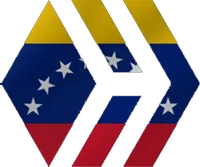
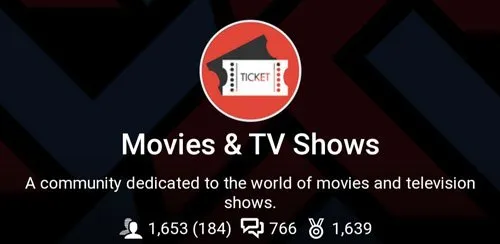

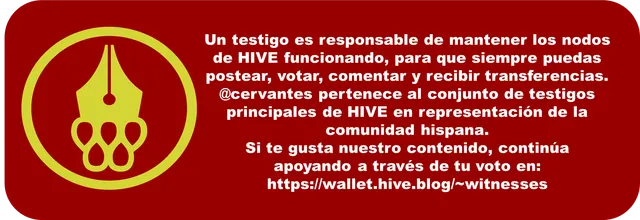
Te invito a apoyar este proyecto como witnes y a formar parte de esta gran comunidad uniéndote a su Discord en el siguiente enlace:
Discord de la comunidad Cervantes





